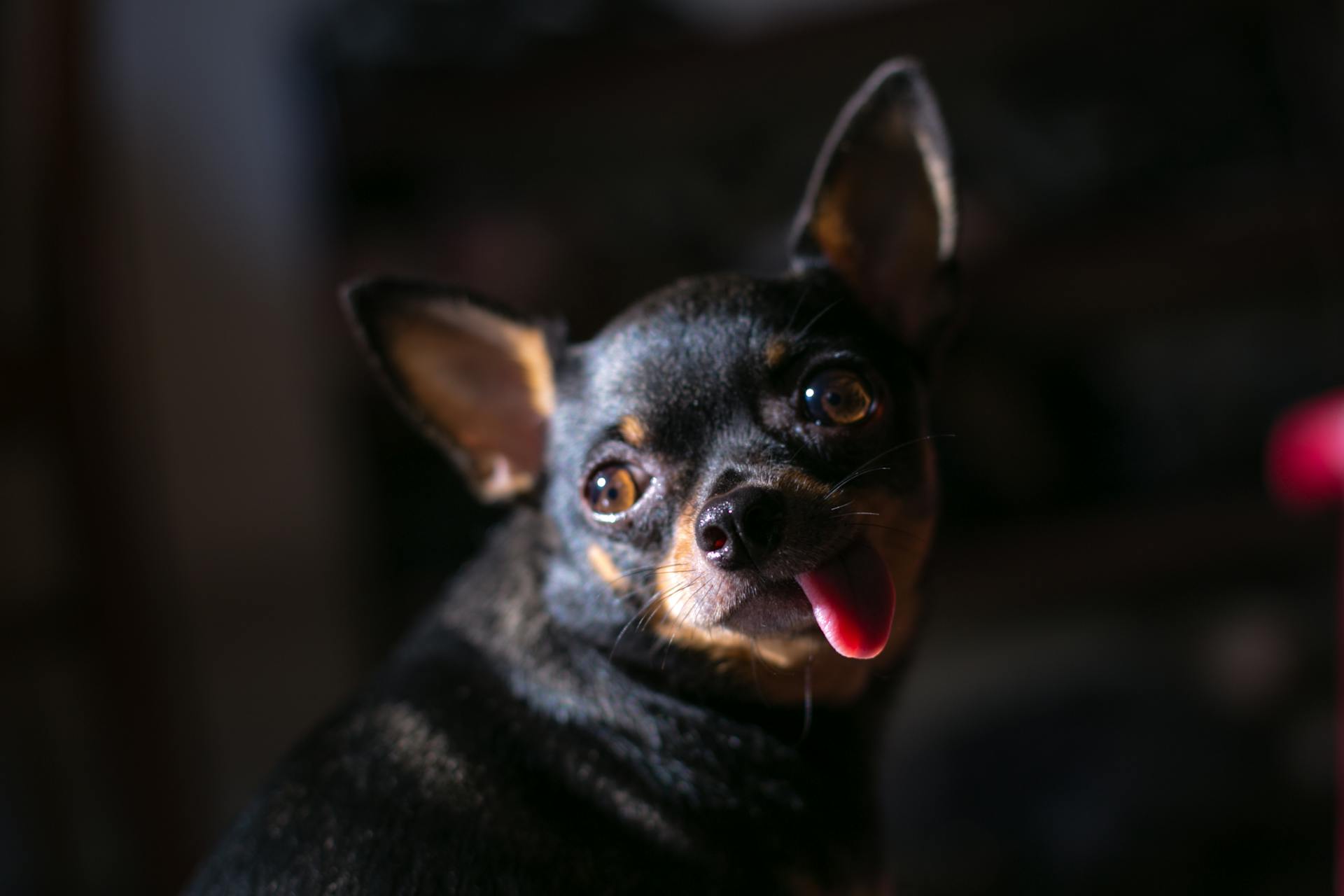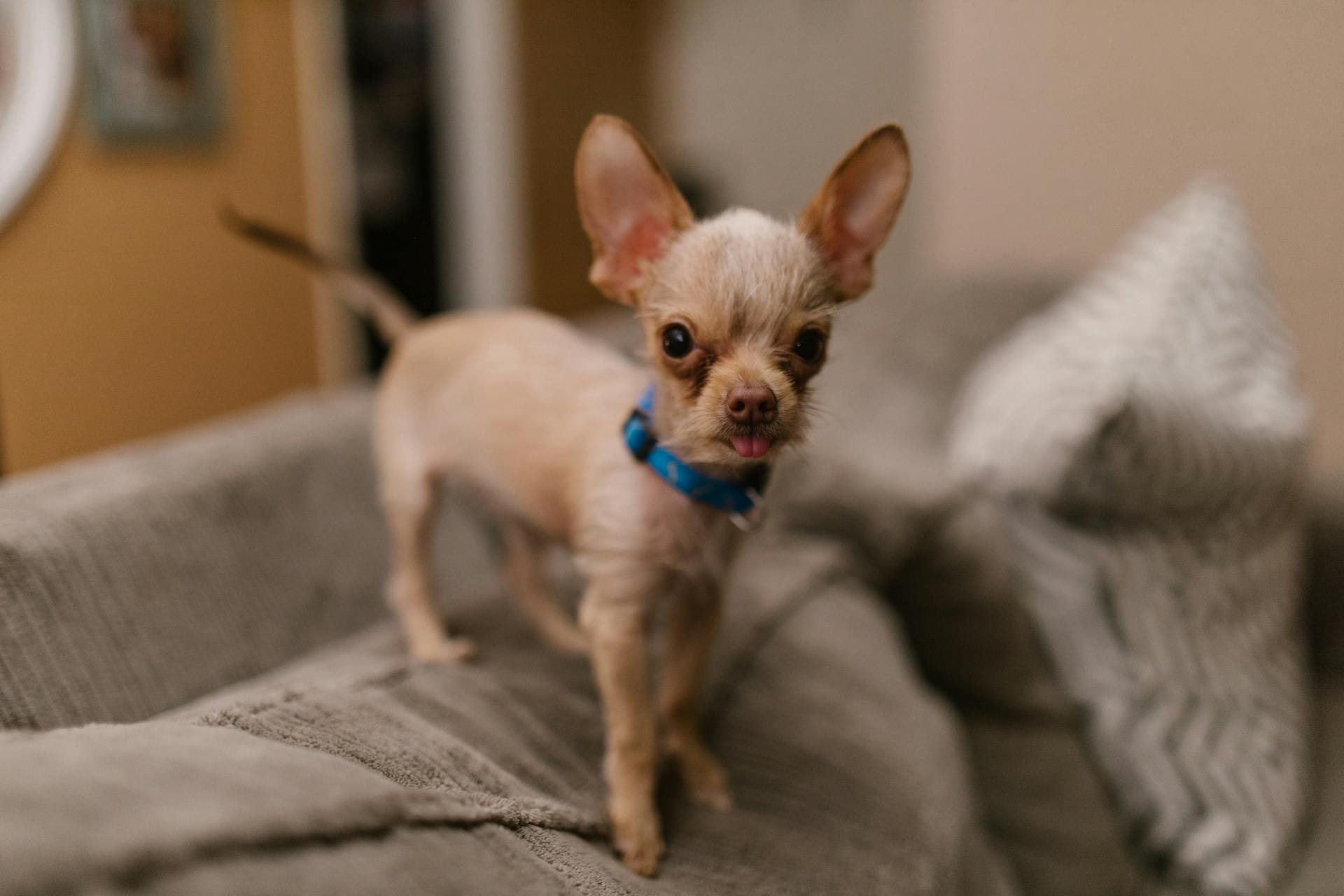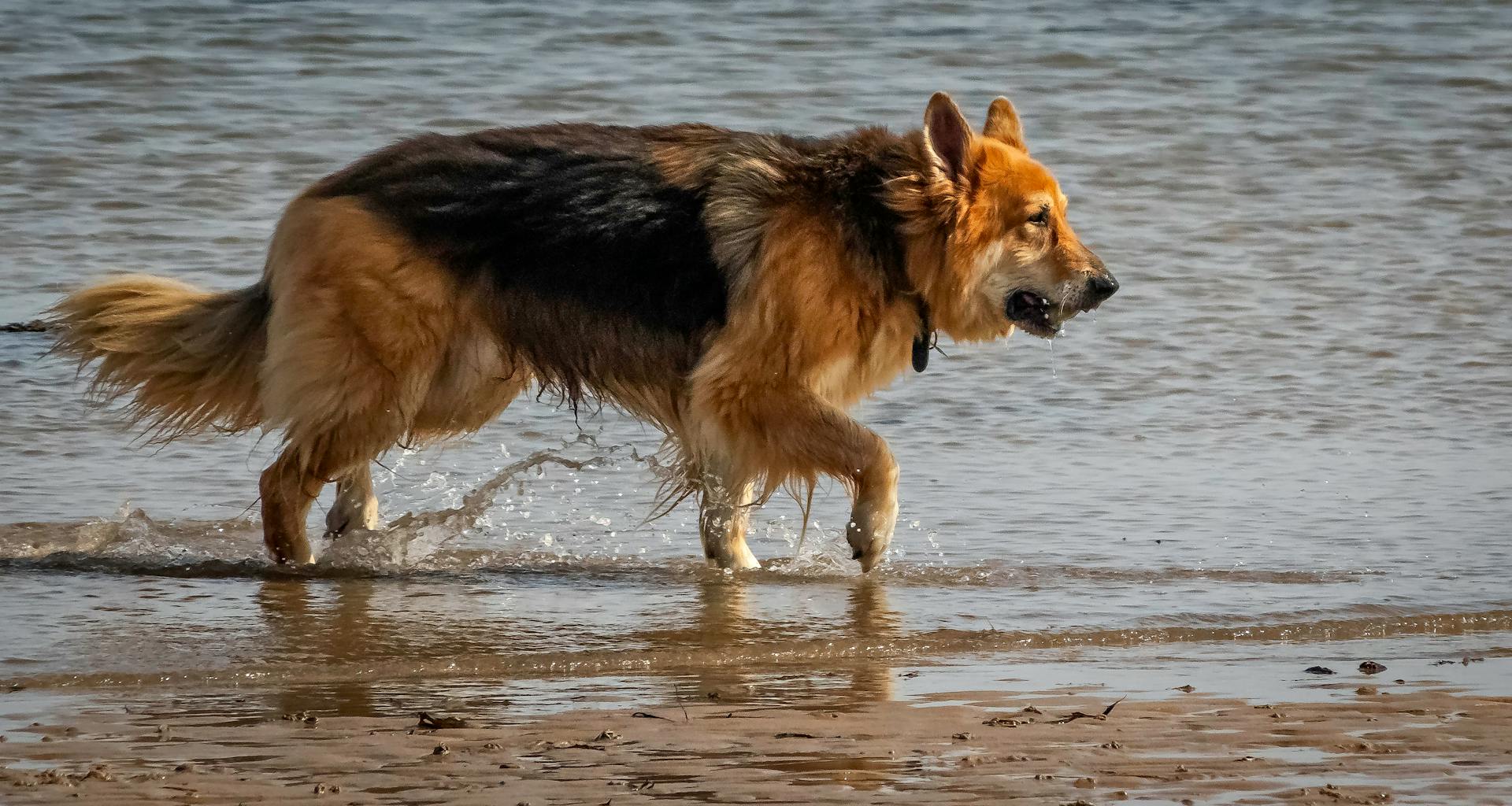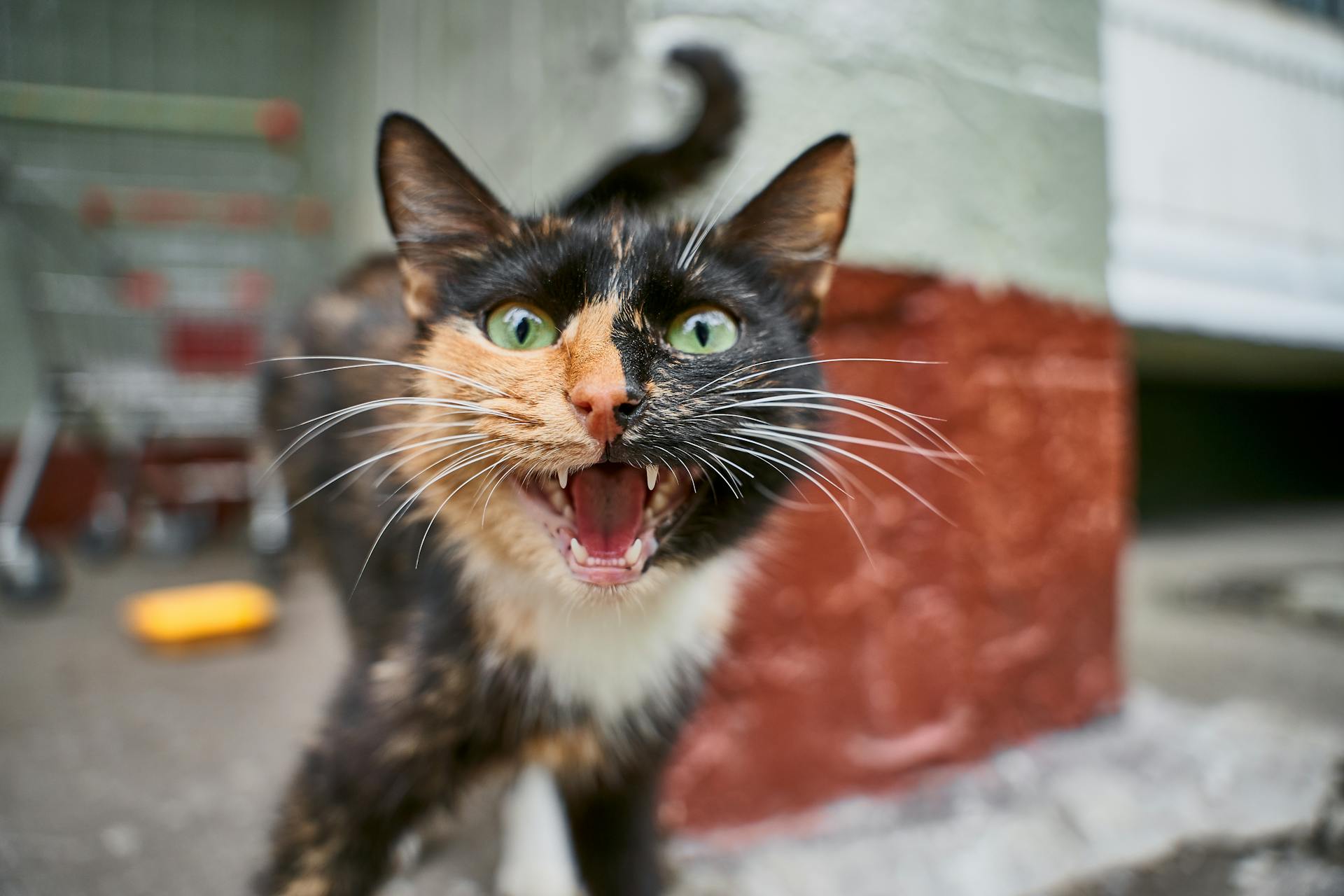
Chihuahuas are often misunderstood as being naturally aggressive, but the truth is more complex. Their small size and big personality can sometimes be misinterpreted as anger.
In reality, Chihuahuas are highly sensitive dogs that can be easily startled or overwhelmed by their environment. This sensitivity can lead to fear-based behaviors that may look like aggression.
One key factor to consider is that Chihuahuas were originally bred as companions for the Aztecs, not as guard dogs. Their primary purpose was to be a loyal and loving friend, not to defend or attack.
As a result, Chihuahuas can be wary of strangers and new situations, which may lead to defensive or territorial behavior.
Readers also liked: Different Kinds of Chihuahuas
Causes of Aggression
Chihuahuas are naturally wary of their surroundings due to their small size. They need to be constantly on the lookout for potential threats.
Their small size also makes them difficult to train using conventional methods. Puppy classes can be overwhelming for toy breeds like Chihuahuas, leading to anxiety and aggression.
Related reading: Why Are Chihuahuas so Small
Some owners tolerate bad behavior in their Chihuahuas because of their small size. A snapping or growling Chihuahua might be laughed off, but a similar behavior in a larger breed like a German Shepherd is not so easily ignored.
Genetics can also play a significant role in a Chihuahua's aggression. They were bred to be courageous and protective, but this can sometimes be taken to an extreme. Some Chihuahuas can be suspicious of strangers and bark excessively when they sense an intruder.
A study shows that Chihuahua owners are less likely to plan for their dog's behavior before bringing it home. This can lead to a strong tendency to see them as "babies" and ignore genetic anxiety and aggression.
Here are some key findings from the study:
- Health and other traits were most important to people who bought Cairn Terriers.
- Personality and temperament was more important to people who had French Bulldogs and Cavalier King Charles Spaniels.
- The more behavioral problems Chihuahuas had, the closer their bond tended to be with their owner.
Small dogs, including Chihuahuas, are 49% more likely to show aggressive behavior than large dogs and 38% more likely to be aggressive than medium-sized dogs.
Breed-Specific Factors
Chihuahuas are naturally wary of their surroundings due to their small size, making them more prone to aggression.
Conventional training and socialization ideas often don't work for chihuahuas and other toy breeds, leading to a default behavior of aggression when they see other dogs.
Some owners tolerate bad behavior in their chihuahuas because of their small size, and this can perpetuate aggressive tendencies.
Here are the top three breeds most likely to be aggressive, according to a study: Miniature Poodle, Miniature Schnauzer, and Rough Collie.
Behavioral Factors
Chihuahuas are naturally wary of their surroundings due to their small size. This can lead to them being more protective of their owners and displaying aggressive behavior towards other people and animals.
One reason for this is that conventional training and socialization methods don't typically work for Chihuahuas and other toy breeds. They can become overwhelmed by noise and larger breeds, leading to a default behavior of barking and lunging at other dogs.
Small Dog Syndrome is a behavioral pattern where some small dogs, including Chihuahuas, display an exaggerated sense of dominance and aggression. This can result from overcompensation due to their small size, coupled with a lack of proper training and socialization.
Fear-based aggression is also common in Chihuahuas, as they use fear as a defense mechanism to protect themselves from perceived threats. This can lead to them becoming tiny tyrants if their owners don't correct their behavior.
Insufficient Exercise
Insufficient exercise can be a major contributor to behavioral issues in dogs. Chihuahuas, in particular, need plenty of physical and mental stimulation to stay healthy and happy.
They are known for being lap dogs, but that doesn't mean they should just stay in the house all day. Without sufficient exercise and mental activity, Chihuahuas may become hyperactive.
This can lead to nipping or barking as a way of expressing their pent-up energy. In fact, Chihuahuas often don't get enough exercise, which can cause them to act mean.
Readers also liked: How Far Can Chihuahuas Walk
Often Not Socialized

Socialization is key to raising a well-adjusted and friendly Chihuahua. Without proper socialization, Chihuahuas can become fearful and defensive of new people and situations.
Lack of socialization during the critical puppy period of 8-16 weeks can cause aggressive behavior in Chihuahuas. This is especially true for Chihuahuas, as they are naturally suspicious of new people and circumstances.
Proper socialization involves exposing puppies to a variety of people, situations, and environments. This helps them become confident and calm in new situations.
Chihuahuas that are not socialized may become aggressive due to their fear of the unknown. They may see almost everything as a potential threat, leading to defensive behavior.
In some cases, Chihuahuas may be so fearful that they become withdrawn and isolated. This can be a sign of underlying anxiety or stress that needs to be addressed.
Table: Signs of Lack of Socialization in Chihuahuas
If you suspect that your Chihuahua is not socialized, it's essential to take steps to address this issue. With patience, consistency, and positive reinforcement, you can help your Chihuahua become a confident and friendly companion.
Owner Interaction
First-time owners often adopt small dogs under the mistaken impression that they're easier to raise, but many small breeds are incredibly stubborn.
Small-breed owners are less likely to train their dogs, making them more likely to be violent and ill-behaved.
Not training your small dog makes it much more likely that they'll meet an untimely end, especially if they bite children or start fights with larger dogs.
Small dogs can still disfigure people, especially small children, so it's essential to give them the same amount of socialization and obedience work as a large dog.
Many small breeds are incredibly stubborn, while large dogs can be agreeable and easy to please, so don't make any assumptions about your dog's behavior.
First-time owners can benefit from doing their research and getting the breed that's right for them, and don't be afraid to ask a pro for help if needed.
If you need to speak with a vet but can't get to one, you can head over to PangoVet, an online service where you can talk to a vet online and get personalized advice at an affordable price.
Recommended read: Do Chihuahuas like to Sleep with Their Owners
Proper training is essential for all dogs, regardless of size or breed, and Chihuahuas are often unintentionally spoiled or coddled due to their small stature.
Without consistent training and boundaries, Chihuahuas might become overly possessive, aggressive, or territorial, but aggression in Chihuahuas is not an inherent trait of the breed.
Every dog is unique, and generalizations based on breed alone are not always accurate, so it's essential to understand the potential reasons behind a Chihuahua's perceived "meanness".
If you're dealing with a Chihuahua displaying aggressive tendencies, seeking professional help from a certified dog trainer or behaviorist is highly recommended.
A fresh viewpoint: Are Chihuahuas Naturally Aggressive
Other Factors
Genetics play a significant role in a Chihuahua's temperament, with some breeds being more prone to anxiety and fear-based behaviors.
Their large eyes and ears can make them highly sensitive to their surroundings, leading to feelings of unease and defensiveness.
Some Chihuahuas can be more territorial than others, especially if they're not socialized properly from an early age.
Their small size can make them feel vulnerable, leading to a more aggressive or fearful response to perceived threats.
A lack of exercise and mental stimulation can contribute to irritability and frustration in Chihuahuas.
Their natural pack mentality can sometimes lead to a "top dog" mentality, with some Chihuahuas becoming overly dominant or aggressive.
Recognizing and Managing Aggression
Chihuahuas are naturally wary of their surroundings, being the smallest dog breed, and this wariness can lead to aggression. They often start by showing early signs of stress, such as averting their face, breathing faster, licking their lips, and yawning, before becoming mean.
Ignoring a Chihuahua's stress signals can encourage bad behavior and lead to aggression. People may even see it as funny and tease their dog to provoke a reaction, which can escalate to snarling and biting.
Proper training and socialization can help make your small dog friendlier, less fearful, and less aggressive. This starts with recognizing and respecting their early cues and signs of anxiety.
Here are some common signs of stress in Chihuahuas:
- Averting their face
- Breathing faster
- Licking their lips
- Yawning
By acknowledging and addressing these signs, you can prevent aggression and create a more positive relationship with your Chihuahua. It's essential to take their stress signals seriously and not ignore them, as this can lead to more severe behavior.
Frequently Asked Questions
How do you calm an angry Chihuahua?
To calm an angry Chihuahua, remain still and speak softly with a soothing tone, avoiding eye contact and aggressive body language. This calm approach can help de-escalate the situation and prevent further conflict.
Sources
- https://chihuahuapower.dog/dealing-with-chihuahua-aggression/
- https://dogo.app/why-are-chihuahuas-so-mean/
- https://pawsafe.com/blogs/dog-behavior/why-are-chihuahuas-so-mean
- https://puppyintraining.com/why-are-chihuahuas-so-mean/
- https://www.dogster.com/lifestyle/why-small-dogs-more-aggressive-than-large-dogs
Featured Images: pexels.com


